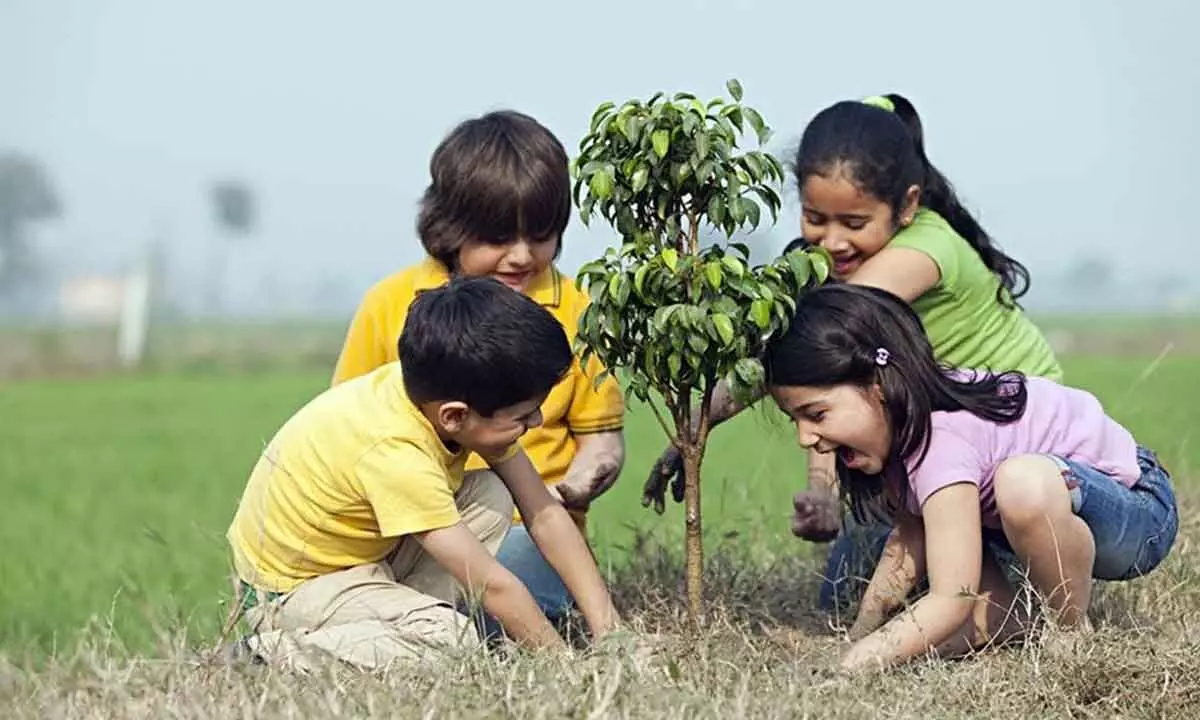Empowering students to create sustainable future

Empowering students to create a sustainable future is not just an educational goal; it’s a global necessity. Schools can play a vital role in shaping the leaders of tomorrow. Through these initiatives, students not only learn about empathy and global problem-solving but also become active agents of positive change in their communities and the world at large. Together, we can cultivate a generation of eco-conscious and socially responsible citizens ready to address the pressing challenges of our time.
In today’s world, the need for empathy and global problem-solving skills has never been greater. The challenges our planet faces, from climate change to social inequality, require a new generation of leaders who not only understand these issues but are also motivated to take action. Schools play a pivotal role in nurturing such leaders by raising awareness, educating their peers and parents, and fostering a culture of sustainability. There are multiple avenues through which schools can engage and empower students to forge a sustainable future.
Campaigns to raise awareness
Raising awareness is the crucial first step toward driving change. Globally, there’s a growing acknowledgment of education’s pivotal role in addressing climate change and other complex challenges. This involves teaching critical thinking, problem-solving, and collaboration.
Schools can launch dynamic campaigns on global issues like climate change, biodiversity loss, and social injustice, actively involving students in planning and executing events, workshops, and awareness initiatives. Students can be instrumental in designing impactful materials such as posters, videos, and presentations that not only highlight the urgency of these issues but also motivate action. By nurturing an environment of awareness and proactive engagement, schools can truly contribute to the collective effort of addressing these pressing global concerns.
Assessing sustainability measures
Higher education institutions (HEIs) play a pivotal role in advancing sustainability efforts. Many HEIs have taken proactive steps to integrate the United Nations Sustainable Development Goals (SDGs) as part of their strategic planning, with a focus on key areas such as governance and campus operations, curriculum development, research initiatives, and community engagement efforts. It is essential for institutions to comprehensively assess their current sustainability measures, involving students in the process. By identifying areas for improvement, students can actively contribute to making their schools more environmentally friendly, instilling in them a sense of ownership and responsibility for their institution’s sustainability.
House wise rewards and recognition
Recognising the existence of eco-friendly practices that benefit our planet, educational institutions have the capacity to instil these habits in students’ lives through a range of initiatives. Participating in sustainability projects allows students to comprehend the far-reaching consequences of their actions on a global scale. Consequently, students develop enduring habits that will persist throughout their lifetime. To motivate students, healthy competitions can be held among different houses within the school. These competitions can focus on sustainability initiatives, such as reducing plastic waste, conserving energy, or promoting eco-friendly transportation. Houses that excel in these areas can receive rewards and recognition, fostering a sense of pride and competition that drives sustainable action.
Involving parents and residential communities
Sustainability education must go beyond school walls. The Swedish National Agency for Education (SNAE) emphasises that sustainability involves shared responsibility across generations, genders, communities, and nations. Research highlights the importance of involving children in discussions and practical activities related to their lives, both at home and in preschool.
To promote this holistic approach, schools can partner with parents and local communities to organise workshops on composting, gardening, and energy conservation. These events, attended by parents and students together, not only raise awareness but also encourage families to embrace sustainability at home.
Creating mini models
Promoting sustainability in schools involves a multifaceted approach, including safety measures, recycling, and activities like gardening. These efforts aim to make sustainability a common and widespread practice in educational settings. These efforts make sustainability a common practice in education. Creating mini models on campus is an effective educational tool. Students can design and implement projects on water conservation, solar energy, and waste management. These models demonstrate sustainable practices, letting students witness their impact and feel like active contributors to a more sustainable world, enhancing their learning. Additionally, these projects can become educational resources for the entire school community.
Student-led sustainability teams
To sustain these efforts over the long term, schools can establish student-led sustainability teams, organised house-wise. These teams, guided by teachers, can be responsible for developing and implementing Standard Operating Procedures (SOPs) for sustainability actions in schools. They can also work on crafting a comprehensive school sustainability policy that outlines the school’s commitment to environmental and social responsibility.
Empowering students to create a sustainable future is not just an educational goal; it’s a global necessity. Schools can play a vital role in shaping the leaders of tomorrow. Through these initiatives, students not only learn about empathy and global problem-solving but also become active agents of positive change in their communities and the world at large. Together, we can cultivate a generation of eco-conscious and socially responsible citizens ready to address the pressing challenges of our time.
(The author is Director of Academic Operations, Initiatives & International Partnerships, at VIBGYOR Group of Schools)














